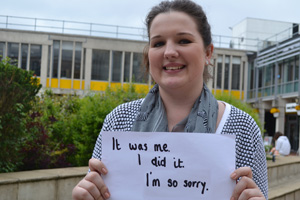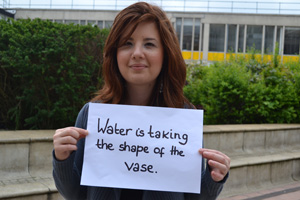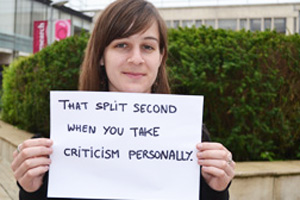
Georgina Beard won the story section of the Microfiction Challenge.
If you thought sharing your news in just 140 characters over Twitter was tough – the University of Essex is now challenging its students to share their ideas using 10 words or less.
The Microfiction Project was established by the University to look at whether encouraging students to be incredibly concise could help develop their higher-level reading, writing and thinking skills, while complementing traditional approaches.
‘Microfiction’ is all about creatively and concisely encapsulating ideas and concepts in just a handful of words and the feedback from students has been incredibly positive to the workshops and competitions developed so far.
The project is being led by Richard Yates and Dr Maxwell Stevenson from the Learning and Development team at Essex and Dr Lisa Wade from the School of Philosophy and Art History in the Faculty of Humanities and Comparative Studies (HCS).
This week they will be presenting a report and demonstration at the second annual Higher Education Academy Arts and Humanities Conference, 'Storyville: Exploring narratives of learning and teaching' taking place from Wednesday 29 May to Thursday 30 May in Brighton.

Georgina Beard won the story section of the Microfiction Challenge.
Richard Yates said: “We are looking at how 'microfiction' can be used to increase students' ability to write concisely, read critically, and manage assignments efficiently.
“We started trialling our workshops with students from the Faculty of Humanities and Comparative Studies and have been getting fantastic feedback. We feel this approach could be applied successfully in other areas.
“Getting students to write very, very concisely can really help them focus on what they want to say either in discussions or in their essays. We have also seen how ‘microfiction’ can help someone understand a very complex piece of text as they are forced to extract the big ideas and then synthesise the most important points into just 10 words or fewer.
“Some students come to University and have not really had any experience in school of writing a précis or summarising a text. ‘Microfiction’ introduces them in a creative way to this important academic skill which also encourages them to develop the discipline and rigour which academic study requires.”

Goedele Caluwe came up with a provocative piece of writing for the Microfiction Challenge.
The ‘write.read.think.good.’ series of creative workshops have been designed to develop the study skills of students while the Microfiction Challenge: ‘think it. write it. post it.’ – has been a hugely popular competition open to students, staff and the public. For the Microfiction Challenge people were asked to submit original pieces of ‘microfiction’ across four categories – stories, ideas, university and education.
• See full results of Microfiction Challenge and examples of student microfiction
Staff-focused workshops are also being trialled to examine the wider benefits to writing, comprehension, and thinking skills in a professional context and specialised sessions have been developed covering art history and human resources.
For more information see: www.essex.ac.uk/ldev/microfiction/
Microfiction Challenge: University category - student winner
'Only 300 Words left! *5% battery* NO! SAVE! PLUG! RUN!'
Sehrish Khan, student, Department of Language and Linguistics
Ends
If you are a journalist and interested in more information aboutn the project please contact the University of Essex Communications Office on 01206 874377 or e-mail: comms@essex.ac.uk